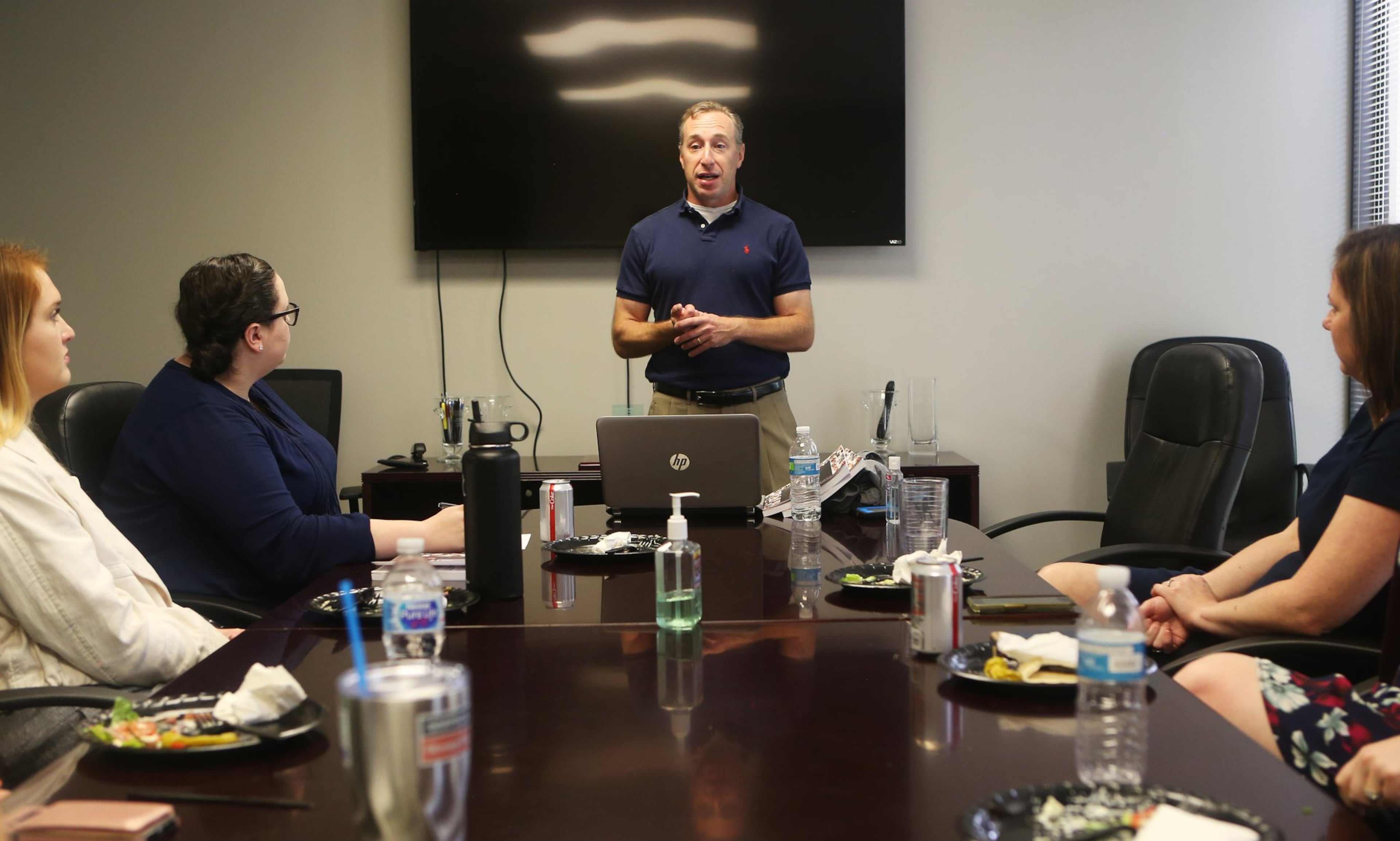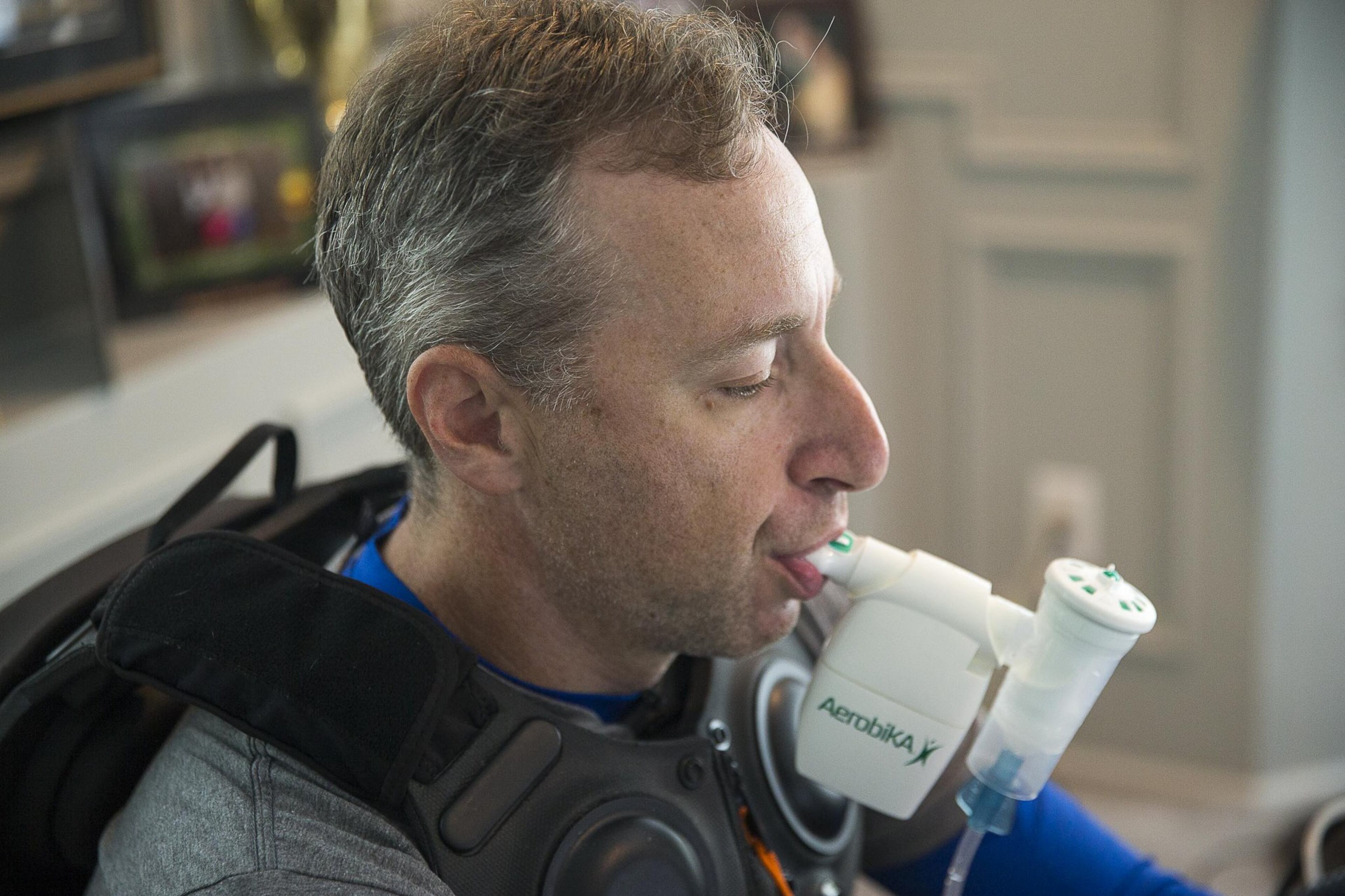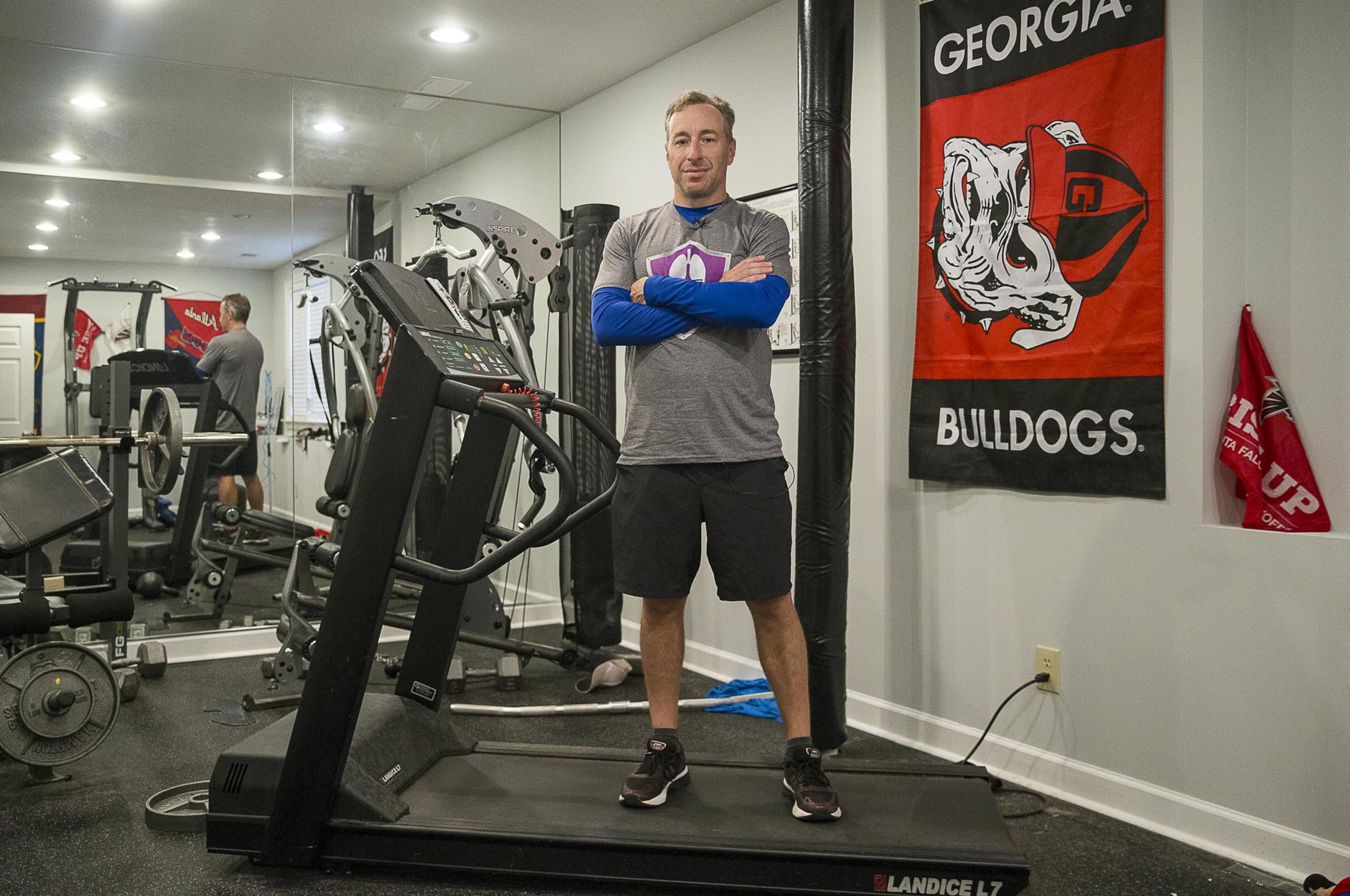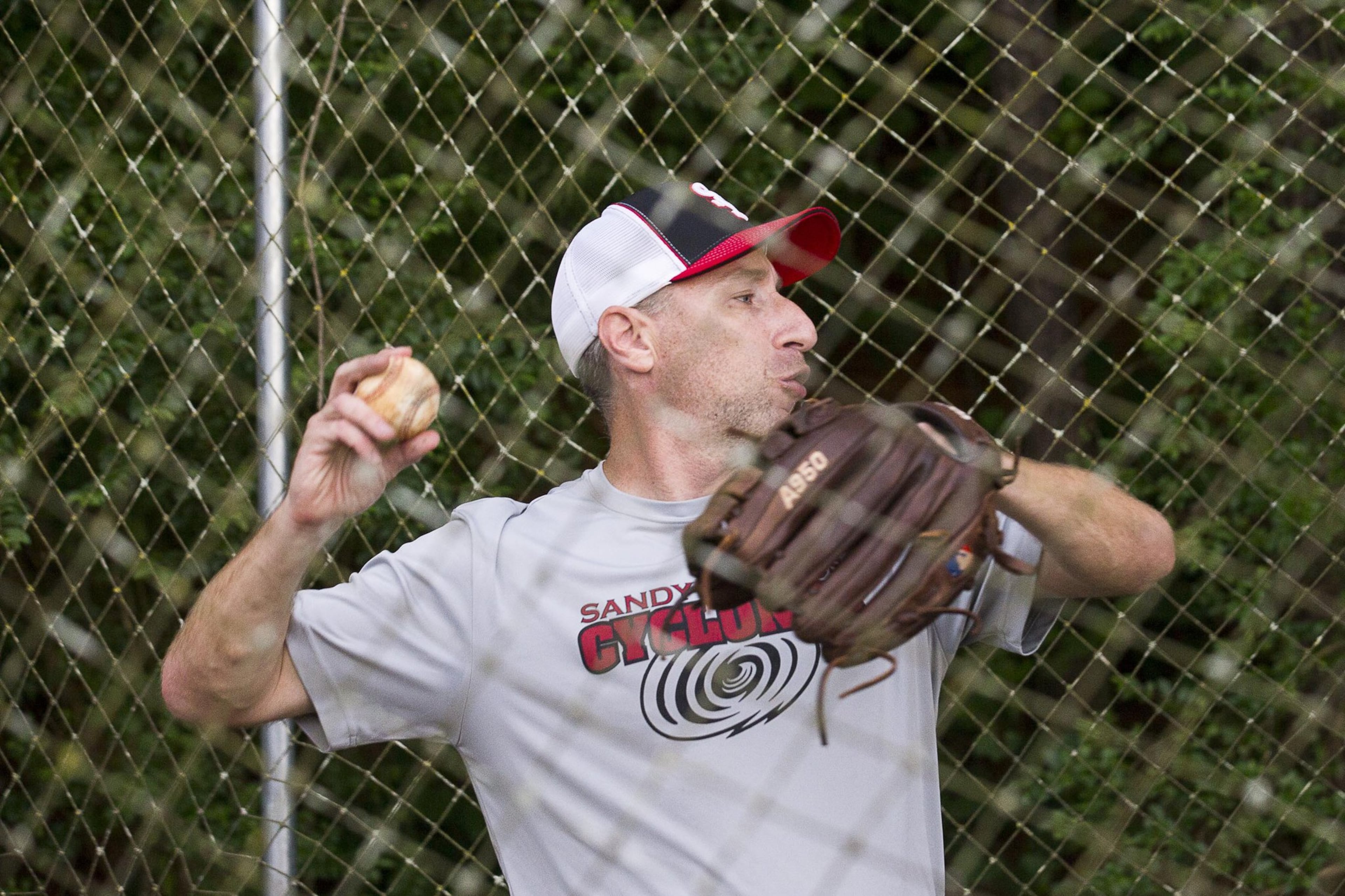At 45, Georgia author with cystic fibrosis lives life fully as he fights odds
Andy Lipman grew up with a fear about the number 25, the year his life would likely come to an end, if not before.
Andy was born with cystic fibrosis, a genetic disease that causes severe damage to the lungs, digestive system and other organs. When Andy was about 9 years old, he researched cystic fibrosis in an encyclopedia and discovered a terrifying statistic about people stricken by the disease: Most don’t reach their 25th birthday.
Fast-forward a decade to the year 1992. Andy was now a sophomore at the University of Georgia, living at a brick fraternity house near Sanford Stadium.
Every evening inside his room, he needed to complete laborious lung therapy sessions wearing a special vest attached to a loud and heavy piece of equipment. Inching closer to 20 and 25, his efforts to extend his life seemed pointless. He spiraled into a deep state of depression and hopelessness. He quit taking his medication, abandoned his therapy treatments, and virtually stopped eating, getting by with slices of strawberry pie from a nearby restaurant.
“I felt so different and I was tired of being different,” said Andy, who grew up in Doraville and now lives in Sandy Springs. “And I kept thinking about the number 25.”
The months passed, and on a cool, winter afternoon, Andy lumbered his way outside to a porch overlooking a basketball court. Fraternity brothers asked Andy to join a game of three-on-three.
One of the fraternity brothers wrapped his thumb and fingers around Andy’s barely-there bicep, and quipped about Andy not winning any weightlifting contests. Lipman was furious — not at the fraternity brother — but at himself.
In a sudden epiphany, he realized he was still alive even though he wasn’t trying. What if he focused on living, committing to managing the difficult illness and doing everything possible to not only reach 25 — but survive well beyond it?
Andy returned to his room, signed up for an advanced weightlifting class and began a laserlike focus on his physical therapy and health. Little by little, he gained weight, became stronger and developed a steely determination to keep living and experience all life has to offer.

Andy is now 45. He’s married, father to two children, an author and motivational speaker.
His new book, "The CF Warrior Project: 65 Stories of Triumph Against Cystic Fibrosis" (BookLogix, $26.99; also available at cfwarriorproject.org), features people who, like him, are persevering and going far beyond what is expected from someone with a life-shortening disease. The average life span of a person with cystic fibrosis in the United States is 37.5, but this figure is constantly increasing as researchers discover new treatments and medications.

There’s 27-year-old Michael Rowe from Colorado, who conquered Mount Kilimanjaro; Jesse Huygh, a 28-year-old circus performer who lives in Belgium; Paul Quinton, a 74-year-old professor of pediatrics at the University of California, San Diego; and 17-year-old Jake Baker of Roswell, who is a first cadet at the Riverside Military Academy in Gainesville, Georgia. (Jake has an older brother, Gavin, who also has cystic fibrosis.)
“For people with cystic fibrosis, I want them to see anything is possible,” said Andy about the book. “And for people outside of it, don’t feel sorry for us. We are living our lives no matter what, and we will keep fighting.”

Understanding the disease
Cystic fibrosis is a progressive, inherited disease that causes thickened mucus to form in the lungs, pancreas and other organs. In the lungs, this mucus blocks the airways, causing lung damage and making it hard to breathe. The mucus also obstructs the pancreas and interferes with the body’s ability to break down and absorb food.
About 30,000 people in the United States are living with cystic fibrosis, and about 70,000 worldwide.
In the past two decades, there have been dramatic advances in the treatment of cystic fibrosis. New cutting-edge medications, the first to be tuned to the genetic mutations that cause the disease, have helped people experience fewer flare-ups and hospitalizations. There’s no cure, but there are new medications to help thin and clear the thick mucus from the airways, enzymes to help digest food, and antibiotics to prevent and treat infections.
Raised with hope
Born in the fall of 1973, Andy was a big baby weighing 10 pounds, 10 ounces at birth. He was also born with a blockage of the small intestine, often an early sign of cystic fibrosis.
Three years before Andy was born, his mother gave birth to a baby girl, Wendy, who was also born with cystic fibrosis. She died from the disease when she was only 16 days old. Andy also has a younger sister, Emily, who was adopted. She is 33.

Back in the 1970s, many children with cystic fibrosis died in infancy or early childhood.
Andy’s parents, Charles and Eva Lipman, didn’t focus on grim statistics or dire odds.
“My parents are Holocaust survivors, and my mom, who is still alive at 95, kept telling me Andy was going to be a miracle baby, and to never give up and to stay positive,” said Andy’s mother, Eva Lipman. “I really believed that, and we lived with hope in our minds.”

During a pre-internet era, the Lipmans didn’t know anyone else with the disease. They looked for inspiring examples about people battling the disease, but they couldn’t find stories about people living long lives.
They watched with Andy the movie “Alex: The Life of a Child,” based on Alexandra Deford, a sweet, bright and brave girl diagnosed with cystic fibrosis. Alex was the daughter of Sports Illustrated writer Frank Deford. Andy’s parents turned the movie off before Alex in the movie (and based on real life) dies at just 8 years old in 1980.
The Lipmans wanted Andy’s childhood to be as normal as possible. They encouraged him to play baseball and tennis. They got him a dog, an Irish setter mix named Howard who became Andy’s constant companion.
But the Lipmans were also nervous about germs and tried to protect Andy from getting sick. For someone with cystic fibrosis, getting a cold or flu could lead to a severe lung infection.

Andy was shy but loved schools. He begrudgingly accepted daily therapy treatments. As a baby and child, before the invention of a chest physical therapy machine, daily postural drainage sessions relied on gravity and percussion. His mom clapped on Andy’s chest and back to help Andy huff forcefully and get the mucus out of his lungs.
Andy’s parents knew their son was struggling mightily during his sophomore year in college. Deeply concerned, they called him, visited him, and encouraged him to continue to take his medication and complete daily therapies.
But during the second semester, Andy’s outlook on life dramatically changed.
“You could see he was motivated,” said his mom. “He was ready, and he knew we were always behind him.”
Ross Jacobs, a transfer student to UGA, met Andy in the early days of the transformation. They worked out together almost every night. Passionate sports fans, and die-hard UGA football fans, they tailgated before games. They played pickup basketball on the court by their brick frat house. Andy developed a reputation for creative shots — whether it was behind the back or a no-look shot or falling out of bounds and somehow still making shots, and almost always from long distances.
Andy set goals to help keep him motivated: get good grades, graduate from college, get stronger and improve his self-esteem.
“Andy went from feeling like a victim and acting like a victim to no, I am not going to sit and take this. I am going to make a difference,” said Jacobs. “That kind of mental fortitude blows my mind.”
Taking a chance on love
In the summer of 1998, Andy met Andrea and was immediately smitten. Andy was working as purchasing manager for an HVAC company. He was living in an apartment with Jacobs. And that fall, upon turning 25, he picked up a pen and started writing his first book, “Alive at 25: How I’m Beating Cystic Fibrosis.” He was defying the odds outlined in an old encyclopedia. He was healthy, happy and very much alive.
A mutual friend suggested Andy and Andrea meet for dinner. Andrea, a vibrant young woman in her late 20s, was an epidemiologist for the Centers for Disease Control and Prevention. She had just been diagnosed with thyroid cancer. Months earlier, Andrea had been diagnosed with multiple sclerosis. With Andrea reeling from the diagnoses, the friend suggested Andy as a good person to meet, someone who could relate to her health challenges. They connected immediately.
“Dealing with a serious illness, it’s nice to be with someone who understands and empathizes and gets the struggle,” she said.

They struck up a friendship. They both loved sports, going to Atlanta Braves games and playing tennis. Andy is more of a quick-witted jokester, but they both enjoy a good laugh.
They remained friends and a couple of years later, while completing a work rotation in Washington, D.C., Andrea called Andy one evening while drinking and said she wanted to start dating. He told her to call him in the morning sober if she really meant it. So she did.
Andy planned elaborate dates with scavenger hunts and clues for restaurants. He took her to Braves games.
“It took a lot of soul-searching,” said Andrea. “I had to be OK with being with someone who was sick. I knew when I dated him I was OK with it.”
Andrea, who has remained cancer-free since undergoing treatment 20 years ago and manages her MS, also knew there would be no guarantees of a long life together.
“Falling in love can happen pretty quickly,” said Andrea. “We had that talk and I told him I was OK with IVF or adoption. We can figure it out. Even if I have you for (only) one or two years, this would be my best decision ever.”

‘Let’s make the most of it’
Andy and Andrea got married in 2002. With help from IVF, Andrea gave birth to daughter, Avery, in 2006. Ethan arrived two years later. “A lot of nights, I go to bed by myself because he has to do his treatments,” Andrea said. “He puts it off until late because he wants to be with me and the kids.”
Every day, in the morning, afternoon and evening, Andy completes an airway clearance treatment that involves inhaling medication and/or saline solution with a nebulizer and using an inflatable vest that is attached to a machine. The machine mechanically performs chest physical therapy by vibrating at a high frequency. The vest vibrates the chest to loosen and thin mucus. Every five minutes, he stops the machine and coughs. This can take between 30 and 45 minutes at each session. He also takes 40 to 50 pills a day.

Dr. William "Randy" Hunt, a pulmonologist and medical director of the Emory Adult Cystic Fibrosis Program, and who is Andy's doctor, said Andy "works incredibly hard at maintaining his health."
“CF has such an incredible disease burden that it can become overwhelming,” Hunt said in an email. “Some individuals become exasperated with all the burden and others risk only focusing on CF and neglecting other areas of their health. I share with my patients that CF should not be their whole life, the singular thing that defines them, but it does have to be a part of their life. … Andy has found that balance.”

Andy has also battled anxiety and depression, and has been open about getting help: He sees a psychiatrist twice a year, a therapist three to four times a year, and practices meditation. He also works out regularly and runs about 15 miles a week. His lungs are functioning at a high level.
On a recent morning, Andy was preparing to run his 23rd Peachtree Road Race.
“Honestly, I didn’t think I was going to live past my 25th year, and the secret to my success is to work hard and a little luck and looking into the future. If I can live the same way today in one year, I can live with that,” he said. “I’m motivated and I’m not like anyone else. You know how they say you have 23,400 breaths every day? I don’t take a single one for granted. We are all here just one time; let’s make the most of it.”

Andy was the head coach of his son Ethan’s Little League baseball team this spring and is an assistant coach for his son’s travel ball team. He was also an assistant coach for his daughter’s spring softball team. He organizes family Ping-Pong tournaments. He and his wife added a pool in the backyard. And they recently installed a tropical fish tank in their renovated basement festooned with sports memorabilia.

On a recent evening, Andy runs batting practice at his son’s Little League practice. His son, Ethan, is up and swings at the ball. The first one is good. He barely makes contact with the second swing.
“Swing earlier and make sure you are stepping toward me,” says Andy.
Ethan makes good contact on the next swing.
“There you go! Looking good!” says Andy.
Then Andy sets a scene for the next pitch. It's the bottom of the ninth, bases loaded, and no outs.
Ethan smiles, takes a breath and hits the ball — hard.
“You just won the game!” says Andy after the ball soars high and well past him.

Clouds darken and raindrops begin to fall on the green grass, and rusty brown dirt in the infield. The group of young baseball players pause and look up. Should they keep playing?
“Oh, that’s just a little rain,” says Andy. “We can keep going.”
Smiling, he holds onto the moment.

WISH FOR WENDY
In 2000, Andy Lipman created “Wish for Wendy,” a 16-team coed charity softball tournament that raises funds for the Cystic Fibrosis Foundation in memory of Andy’s sister, Wendy. The tournaments have raised more than $4 million, and the 20th annual event is scheduled for October.
For more information, go to wishforwendy.org.

THE 6 FEET APART RULE
People with cystic fibrosis must maintain at least 6 feet of distance from each other to avoid dangerous cross-infection. For his book, Andy Lipman interviewed people by phone and Skype.
The movie “Five Feet Apart,” released earlier this year, revolves around two teenagers with cystic fibrosis who meet in a hospital and fall in love. They carry a pool cue between them to keep them at an achingly safe distance. The romance in “Five Feet Apart” bears resemblance to Katie and Dalton Prager’s highly publicized love story — the media called them the real-life “Fault in Our Stars” couple. Sadly, the Pragers died just five days apart in 2016.
“Five Feet Apart” director Justin Baldoni directed a short documentary about Claire Wineland, a young, bright and spunky woman with cystic fibrosis who documented her life on YouTube. Some videos have garnered well over 1 million views. She served as a consultant on “Five Feet Apart” before she died last year at the age of 21 from a massive stroke she suffered soon after a lung transplant. She is also included in Andy’s new book.
Dr. William "Randy" Hunt, a pulmonologist and medical director of the Emory Adult Cystic Fibrosis Program, said the "6 feet apart" rule makes cystic fibrosis a "very isolating disease." People with other diseases like cancer can join support groups. While the internet and social media can help people with cystic fibrosis connect online, Hunt said, "it is still not quite the same as being in person with someone who knows exactly what you are going through to share a hug, laugh or tear. I think that is a really tough part of this illness."


